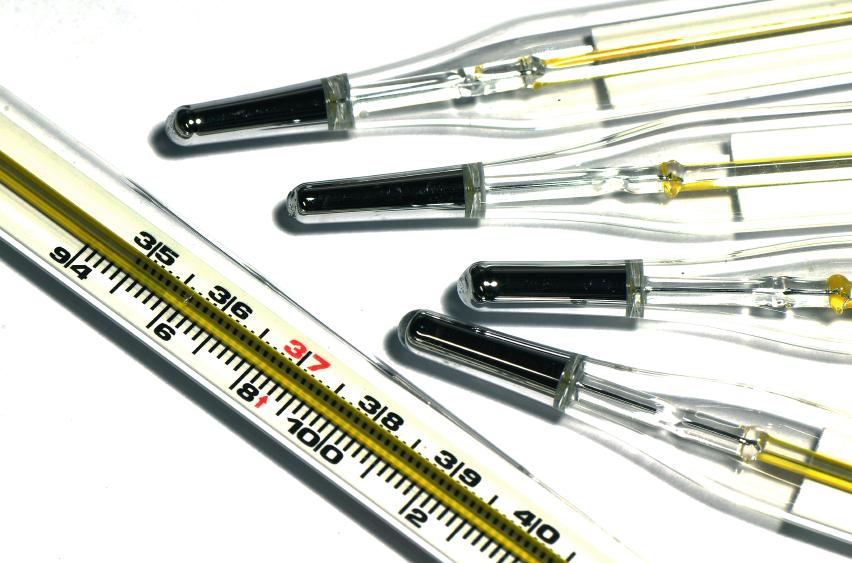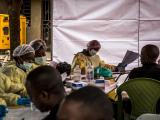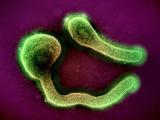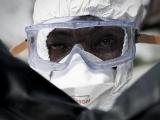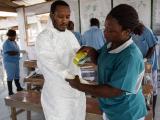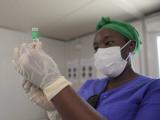Contact tracing teams working on the response to the Texas Ebola case have identified 50 people for 21-day fever monitoring, but only 10 of them had high-risk exposure, Texas health officials announced today, along with news that hazmat teams have started cleaning the home but face some roadblocks in transporting contaminated items.
As a joint media briefing today hosted by the Centers for Disease Control and Prevention (CDC), Beth Bell, MD, MPH, director of the CDC's National Center for Emerging and Zoonotic Diseases, said the 50 people will be asked about their symptoms each day and be educated about the disease. "It is a possibility that some people who are close contacts might develop Ebola; that's why close monitoring is so important."
David Lakey, MD, commissioner with the Texas Department of State Health Services (TDSHS), said public health teams will visit each of the individuals every day, taking their temperatures twice a day. "All of those individuals are doing well," he said.
He didn't say how many health workers were on the list, but said some are from the ambulance team. He said epidemiologists who did the contact tracing steps cast a wide net that included the workers who drew and processed the patient's blood at the hospital.
Dallas officials face hazmat challenges
Clay Jenkins, Dallas County judge, said cleaning and hazmat (hazardous materials) activities began today in and around the family's apartment, but city officials are running into problems because they don't have the permits to transport and dispose of the soiled items they remove. He said the items don't require a permit to move the materials within Dallas County, but federal permits are required for movement outside the county.
"Until local officials get the needed Department of Transportation [DOT] permits, the materials will be moved to a secure, temporary storage location in Dallas County that will be guarded by law enforcement," Jenkins said.
He said he visited the family at their apartment last night and apologized for the delay in cleaning their apartment. "I would want them treated as I'd want my own family treated," he said, adding that the patient's items have been bagged and isolated in one of the home's rooms. Ideally, the family would be moved to a location where they have everything they need in one place, such as laundry, he said.
Bell said she anticipated the DOT permit issues should be resolved very shortly. "It's not a very large roadblock that we can't overcome," she said.
EHR problem identified in travel history glitch
In other local developments, Texas Health Resource, the parent company of the hospital in which the patient is being treated, last night released more details about his first visit to the facility's emergency department, during which his care team didn't take into account his history of recent travel to Africa.
Health officials said the man was asked about travel history at the initial visit, but the information wasn't relayed to the clinical staff, who could have made the decision to isolate the man earlier, minimizing the risk of further spread of the disease.
The patient remains hospitalized at Texas Health Presbyterian Hospital in Dallas, where he remains in serious condition.
In a review of his first visit to the emergency department on Sep 25, the man had a temperature of 100.1°F, a 2-day history of abdominal pain, a sharp headache, and decreased urination, which the hospital said could have been consistent with many other infectious diseases. He said he had not had nausea, vomiting, or diarrhea. When questioned if he had been around anyone who was sick, the man replied that he had not.
When asked if he had traveled outside the United States in the last 4 weeks, he said that he had been in Africa, which the nurse entered in the nursing workflow part of the electronic health record (EHR).
The health system said nurses and physicians both followed proper protocols, but they found a flaw in the way the physician and nursing portions of the EHRs interacted in the patient's case. It added that the nursing and physician functions in the EHR have separate workflows, and that, as designed, the travel history would not automatically appear in the physician's standard workflow.
Based on the findings, the hospital relocated the travel history documentation to a part of the EHR that is part of both workflows, and increased the travel question and documentation visibility to alert all health providers.
West Africa numbers climb
Meanwhile, the World Health Organization (WHO) said today that the number of suspected and confirmed infections in West Africa's Ebola epidemic has climbed to 7,470, with the number of deaths now at 3,431.
The total reflect an increase of 292 illnesses and 93 deaths since the WHO's previous update on Oct 1. Much of the increase comes from Liberia and Sierra Leone in equal amounts, but in the latest report, Liberia cases were reported only through Sep 30, while those from Sierra Leone and Guinea are as of Oct 1.
Health officials believe the official numbers vastly underestimate the true burden of the disease, thought to be two to three times higher than what's listed in official reports.
Response priorities and developments
On the global response front, the United Nations Mission for Ebola Emergency Response (UNMEER) said in an update today that Anthony Banbury, head of the mission, is in Liberia, where he heard from nongovernmental organizations and other groups involved in the response.
The groups raised concerns about a lack of logistical support and vehicles. They told Banbury that vehicles are especially needed to take patients to Ebola treatment units and to transport bodies for burial.
Doctors without Borders (MSF) told Banbury that the greatest need is medical teams, rather than cash.
The group said economic worries are rising as the outbreak escalates, with border closures and movement restrictions having recently raised the price of rice 20% in Liberia and Sierra Leone, with agricultural trade volume declining in Guinea.
UNMEER said several response developments came out of a donor's conference for Sierra Leone in London yesterday, with the United Kingdom unveiling a pilot program to set up community health centers in the country to enable quick diagnosis, along with temporary isolation and care for infected patients who need to find a bed in one of the formal Ebola treatment units.
During the conference additional pledges came from Germany, Canada, Australia, Ireland, Italy, and Japan, UNMEER said. Also yesterday, the United Arab Emirates announced a donation to the United Nations Children's Fund (UNICEF) of nearly $4.5 million.
In a related response development, the United States could deploy up to 4,000 troops to help in West Africa, 1,000 more than first announced, Pentagon press secretary Navy Rear Adm John Kirby said at a Department of Defense (DOD) news briefing today.
He said two Navy Ebola testing labs are now operating and can process 100 samples per day, and US personnel are building a mobile hospital for infected health workers that should be completed by Oct 18. In addition, work began on two treatment centers that should be completed by the end of the month, Kirby said.
More foreign cases in West Africa; experts warn of another big outbreak
In other Ebola developments:
- A freelance photographer working with an NBC News crew in Liberia has been infected with Ebola and will be airlifted back to the United States, the news organization reported today. The 33-year-old man was hired Sep 30 by NBC and started having symptoms the next day. He is being treated in an MSF facility, and the news crew is in self-quarantine and monitoring their temperatures.
- A Ugandan doctor sickened with Ebola in Sierra Leone has arrived in Germany for treatment at Frankfurt University Hospital, the BBC reported today, citing hospital officials. The patient had been working for an Italian aid organization and is the second health worker to be airlifted to Germany after getting sick in West Africa.
- Thai researchers from Mahidol University yesterday announced that its researchers have developed an experimental antibody treatment for Ebola, according to an Oct 2 statement. The treatment consists of single-chain antibodies that are five times smaller than conventional antibodies, can be produced quickly from bacteria, and have the capacity to enter infected cells. The WHO and the US National Institutes of Health have offered help in testing the experimental treatment, Voice of America (VOA) reported today.
- A group of Ebola experts said yesterday that the massive scale of West Africa's Ebola outbreak has fundamentally changed the epidemiology of the disease, making prospects for controlling the disease bleak. The authors, who include Peter Piot, MD, PhD—known for helping identify the Ebola virus in 1976—raised the concerns in a commentary in The Lancet Infectious Diseases. He and two coauthors wrote that, with overwhelmed treatment centers, patients are forced back into the community, and the difference between this and previous Ebola outbreaks is the sheer size, and not a mutated virus. The recent epidemic confirms that the reproductive number is substantially higher than 1, which implies the possibility of another major outbreak in the future, they noted. They warned that, with the virus reservoir expanding in Africa, a large epidemic could happen again, unless the world remains vigilant, responds promptly, and has more to offer than just isolation and quarantine.
See also:
Oct 2 Texas Health Resource statement
Oct 3 CDC transcript of media briefing
Oct 3 WHO Ebola roadmap response update
Oct 3 UNMEER update
Oct 3 DOD report
Oct 3 NBC News report
Oct 3 BBC report
Oct 3 VOA report
Oct 2 Mahidol University statement
Oct 2 Lancet Infect Dis extract
